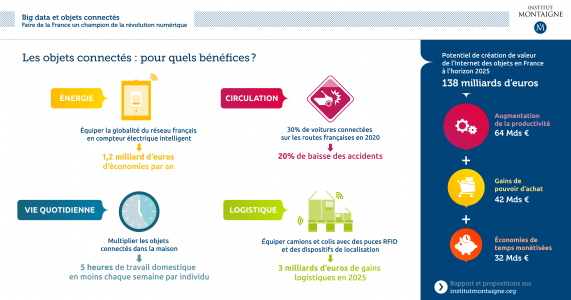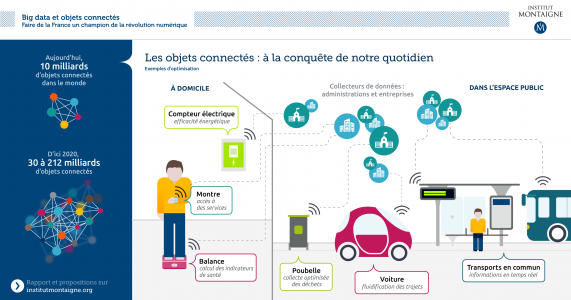[:fr]
La révolution du Big data et des objets connectés crée d’immenses perspectives de création de valeur mais suscite également des interrogations nouvelles sur la protection des droits des individus. Pour renforcer la confiance entre les acteurs et soutenir le développement de modèles économiques innovants, les différentes parties prenantes doivent saisir les opportunités offertes et travailler en confiance.
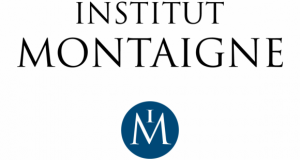 Comment faire de la France un champion de la révolution numérique ? Ce rapport publié au sein de l’Institut Montaigne identifie quatre axes pour coordonner les actions de la puissance publique et des acteurs privés : diffuser l’excellence technologique dans le tissu économique, garantir la confiance entre les acteurs, renforcer la gouvernance du numérique et l’influence de France, et enfin répondre aux nouveaux besoins de compétences.
Comment faire de la France un champion de la révolution numérique ? Ce rapport publié au sein de l’Institut Montaigne identifie quatre axes pour coordonner les actions de la puissance publique et des acteurs privés : diffuser l’excellence technologique dans le tissu économique, garantir la confiance entre les acteurs, renforcer la gouvernance du numérique et l’influence de France, et enfin répondre aux nouveaux besoins de compétences.
→ Lien du rapport: Big data et objets connectés. Faire de la France un champion de la révolution numérique
Infographie Big Data et objets connectés (Rapport Institut Montaigne, 2015)
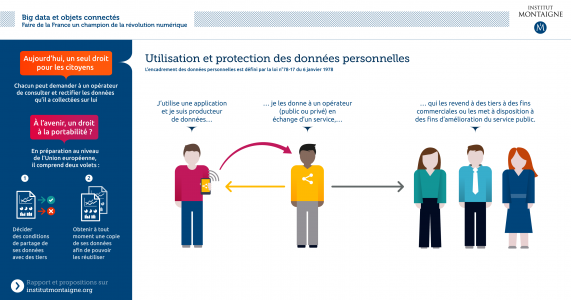
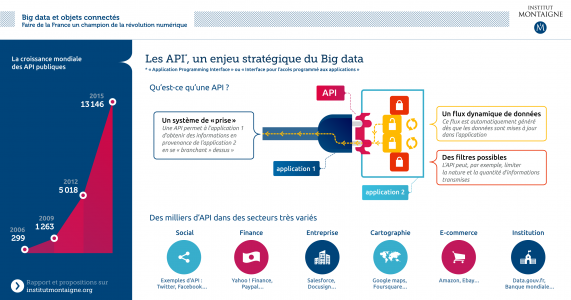
Contributeurs
- , Digital champion, co-président du groupe de travail
- , Directeur général de Cisco France, co-président du groupe de travail
- , Directeur général Stratégie, études et marketing France, JCDecaux
- , Associé responsable du secteur télécom et technologie, AT Kearney
- , Chargé de projet Innovation et prospective, CNIL
- , Secrétaire général, Cisco France
- , Chargé de recherche au CNRS et chargé d’enseignement à l’Ecole Polytechnique ;
- , Haut fonctionnaire, co-rapporteur du groupe de travail
- , Manager, AT Kearney, co-rapporteur du groupe de travail
Résumé
Le mouvement qui a débuté dans les années 2000 avec l’essor d’Internet puis du Web 2.0, des réseaux sociaux et des smartphones, s’est poursuivi par le développement des objets connectés et du Big data. La prochaine vague de croissance d’Internet viendra de la convergence des personnes, des processus, des données et des objets : il s’agit de l’« Internet du Tout connecté ».
Souvent perçus comme appartenant au domaine du bien-être et du loisir, les objets connectés recouvrent pourtant une myriade de techniques, d’utilisations et de services possibles. La multiplication des capteurs entraîne la « numérisation du réel » et la quantité exponentielle de données générées alimente le Big data. L’Internet des objets contribuerait ainsi à doubler la taille de l’univers numérique tous les deux ans, lequel pourrait représenter 44 000 milliards de gigaoctets en 2020, soit 10 fois plus qu’en 2013.
Un enjeu économique majeur qui interroge la transformation digitale des entreprises
Une estimation économique inédite réalisée par A.T. Kearney pour l’Institut Montaigne souligne que les objets connectés associés au Big data représentent un potentiel de création de valeur estimé entre 74 milliards d’euros en 2020 (soit 3,6 % du PIB) et 138 milliards d’euros en 2025 (7 % du PIB). À ce potentiel, issu de trois leviers de création de valeur (augmentation de la productivité, gains de pouvoir d’achat et économies de temps monétisées), s’ajoute le développement d’un nouveau marché d’achat d’équipements connectés, estimé à 15 et 23 milliards d’euros respectivement en 2020 et 2025.
Si la révolution numérique est transverse, certains secteurs seront particulièrement impactés, comme le logement (économies d’énergie, développement de la domotique, etc.), la mobilité (systèmes d’aide à la conduite, coordination entre les véhicules, etc.) ou encore la santé (amélioration des politiques de prévention, de la prise en charge des maladies chroniques, etc.).
Un à un, tous les secteurs économiques vont basculer dans l’ère numérique, menaçant les entreprises de disparition si elles n’évoluent pas. Les entreprises sont donc contraintes à repenser leur positionnement dans ce nouveau paradigme, à développer de nouveaux avantages compétitifs, puis à se transformer pour saisir les opportunités qui s’offrent à elles.
Comment réguler les usages tout en permettant le développement d’une économie de la donnée ?
La multiplication des capteurs dans l’espace public et privé rend possible l’obtention de données qui permettent d’analyser les activités, les comportements et les modes de vie des individus. Or, l’invisibilité des capteurs et l’opacité partielle des traitements opérés sur les données sont très néfastes à la confiance entre les acteurs, véritable socle de l’économie numérique.
Pour y remédier, plusieurs actions peuvent être entreprises : par exemple, les Application Programming Interfaces ou API (en français « interfaces de programmation »), qui font le lien entre un utilisateur et une application et assurent l’interopérabilité de différents programmes et plateformes, peuvent servir d’outil pour suivre l’utilisation des données qui sont produites.
De plus, le développement du Big data et des objets connectés suscite des interrogations fortes liées à la protection de la vie privée. La transparence autour des données représente ainsi un défi pour les pouvoirs publics, chargés de garantir les droits des individus mais aussi de permettre l’émergence d’entreprises innovantes proposant de nouveaux modèles économiques tournés vers la donnée. Pour réconcilier les usages, la compétitivité et la technique, les pouvoirs publics pourraient promouvoir un cadre législatif souple qui participerait au besoin actuel de sécurité et de transparence entre les acteurs.
Quatre axes de propositions pour faire de la France un champion de la révolution numérique
Il est donc indispensable qu’en même temps que se développe l’utilisation du Big data et des objets connectés, une réflexion soit menée sur ses conséquences sociétales et sur la manière dont les individus, l’État et les entreprises acceptent collectivement de faire évoluer nos sociétés. La France dispose pour ce faire de nombreux atouts, dont font partie un réseau de startups créatives et de champions industriels de grande taille, ainsi qu’un savoir-faire reconnu internationalement dans les domaines scientifiques et techniques.
Le Big data et les objets connectés sont au cœur d’une nouvelle ère numérique, dans laquelle les pouvoirs publics, les entreprises et les individus doivent saisir, en confiance, toutes les opportunités économique et sociétales. La France, dans un cadre européen, peut en devenir un acteur de premier plan à condition qu’une action volontariste, équilibrée et coordonnée des acteurs privés et de la puissance publique soit conduite.
[:en]The revolution of Big data and connected objects creates huge value creation opportunities but also raises new questions about the protection of individual rights. In orde to strengthen confidence between stakeholders and support the development of innovative business models, the numerous stakeholders must seize opportunities and work with confidence.
 How to make France a leader of the digital revolution? The report published by the Montaigne Institute identifies four areas to coordinate the actions of public authorities and private actors: diffusing technological excellence in the economic fabric, ensuring confidence among stakeholders, strengthening governance and the digital influence of France, and finally responding to the new skill needs.
How to make France a leader of the digital revolution? The report published by the Montaigne Institute identifies four areas to coordinate the actions of public authorities and private actors: diffusing technological excellence in the economic fabric, ensuring confidence among stakeholders, strengthening governance and the digital influence of France, and finally responding to the new skill needs.
→ Link to the report: Big Data and the Internet of Things: making France a leader in the Digital Revolution
Infographic Big Data and IoT (Institut Montaigne, 2015)


Authors
- , Digital champion, co-président du groupe de travail
- , Directeur général de Cisco France, co-président du groupe de travail
- , Directeur général Stratégie, études et marketing France, JCDecaux
- , Associé responsable du secteur télécom et technologie, AT Kearney
- , Chargé de projet Innovation et prospective, CNIL
- , Secrétaire général, Cisco France
- , Chargé de recherche au CNRS et chargé d’enseignement à l’Ecole Polytechnique ;
- , Haut fonctionnaire, co-rapporteur du groupe de travail
- , Manager, AT Kearney, co-rapporteur du groupe de travail
Summary
The movement that got under way in the first decade of the 21st century with the rise of the Internet and the advent of Web 2.0, featuring social networks and smartphones, has continued with the development of the Internet of things and Big Data. The next wave of Internet growth will spring from the convergence of persons, processes, data, and objects — the “Internet of Everything”.
Connected things are still often perceived as products for personal wellbeing and leisure, but they include a myriad of potential technologies, uses, and services. The multiplication of sensors entails the “digitization of reality”, and the exponential growth in the quantity of data generated is expanding the size of Big Data. The Internet of things is thus helping to double the size of the digital universe every two years, and could grow it to 44,000 billion gigaoctets in 2020 — ten times its bulk in 2013.
A major economic potential that challenges the digital transformation of firms
An unpublished economic estimate carried out by A. T. Kearney for the Montaigne Institute points out that the Internet of things linked to Big Data represents a potential for value creation estimated at 74 billion euros in 2020 (that is, 3.6% of France’s GDP), rising to 138 billion euros in 2025 (7% of GDP). To this potential, which flows from three drivers of value creation (boosted productivity, increased buying power, and monetized time savings) should be added the development of a new market for the purchase of interconnectivity hardware, a market estimated at 15 to 23 billion euros in 2020 and 2025 respectively.
The digital revolution is spreading itself everywhere, but certain sectors feel the impact more strongly than others. They include housing (with increased productivity, gains in buying power, the development in home automation), transportation (systems to assist drivers, coordination of numerous vehicles), and health care (improvement in prevention policies, the care of chronic illnesses).
One by one, each of these sectors of our economy will be overtaken by the digital wave, and some firms will face extinction if they fail to evolve. So businesses must inevitably plan how to position themselves on this new terrain, they must seek out fresh sources of competitive advantage, and then they must transform themselves in order to seize the opportunities that await them.
How to regulate data exploitation while letting the data-based economy develop?
The multiplication of sensors in the public and private space makes it possible to capture data that permit analysis of the activities, behavior, and lifestyles of individuals. The invisibility of all these sensors, however, and the partial secrecy surrounding the treatment of the data acquired, are both very harmful to trust among economic actors — the true bedrock of the digital economy.
Several practical remedies are available, including Application Programming Interfaces (APIs). These link users to applications and ensure the interoperability of different programs and platforms; they can be employed to track how the data acquired are being utilized.
More generally, the spread of Big Data and connected things raises compelling questions about privacy protection. The need to be transparent about data poses a challenge to political and regulatory authorities. They are charged with guaranteeing the rights of individuals, but also with stimulating the emergence of innovative firms whose business plans are built around the exploitation of data. To coordinate data usage, competitiveness, and technology, the public authorities could promote a supple legislative framework that would meet the current need for security and transparency among actors.
Four sets of proposals to make France a leader in the digital revolution
It is therefore indispensable that, as the utilization of Big Data and connected things advances, thought be given to the impact on society, and on the manner in which individuals, the State, and firms, agree collectively to drive our societies forward. In this arena France enjoys many assets, including a network of creative startups and large-scale industry leaders, as well as internationally acknowledged know-how in the areas of science and technology.
Big Data and the Internet of things lie at the heart of a new digital era, in which public authorities, firms, and individuals must confidently grasp the complete range of economic and social opportunities on offer. France, within the European framework, is in a position to play a leading role, provided that private actors and public authorities pursue a course of action that is deliberate, balanced, and coordinated.[:]

